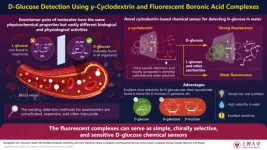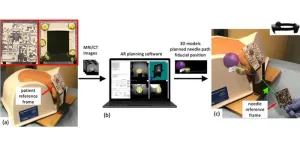(Press-News.org) New research from the Work Foundation at Lancaster University reveals that while two thirds of senior business leaders (66%) agree that employers have a ‘substantial role’ to play in supporting staff through the rising cost of living, only 40% have introduced new support measures since the start of 2022.
At the same time, four in ten business leaders (41%) also report increases in production costs in their organisation. Pressures that are likely to increase, the Work Foundation warns, as Government support on energy costs reduces in April 2023, with sectors like hospitality and leisure particularly at risk.
Polling more than a thousand senior decision-makers from British firms in December 2022, the new study explores the role organisations have to play in supporting staff during the cost of living crisis.
Findings reveal that financial wellbeing support for employees throughout 2022 was ad-hoc, responsive and focused on the short-term. Data also shows:
Less than one in five (18.2%) British business leaders who introduced cost of living support said they awarded pay rises that were above standard incremental increases – failing to protect employees’ pay against double-digit inflation.
After pay rises, the second most common offer of support was a one-off bonus/ cost of living support payment for staff (17.7%). While a huge help to many, such discretionary payments can cause disruptions and reductions in essential social security payments for low income workers.
Larger organisations are more likely to have provided support to mitigate the impact of rising costs on workers than smaller firms (49% and 32% respectively).
The study also indicates a split between workers when it comes to their expectations of their employers. Staff in secure employment and on higher pay tend to expect more of their organisations. They expect broader ranges of support to be available, beyond pay rises; whereas lower paid workers in more insecure forms of employment don’t expect any support beyond pay increments.
Ben Harrison, Director of the Work Foundation at Lancaster University, said: “Employers have a crucial role in supporting their workers through the cost of living crisis. Even if we see inflation halve in 2023, the impact of rising prices will last long into the future, especially for those on low incomes and in insecure employment – factors which disproportionately affect women, disabled people and those from black and ethnic minority backgrounds.
“It’s vital that business leaders engage with their workforce to understand the challenges their employees face, and put proper financial wellbeing strategies in place. Ensuring pay levels rise as close to inflation as possible is key, but if businesses find themselves unable to afford such an uplift, there are lots of other ways they can offer support.”
The study reveals some of the employers who are providing support are finding innovative ways to help. Examples include providing in-store vouchers or pre-loaded giftcards; flexibility over pay dates, independent financial planning advice and interest free loans to help employees move away from a reliance on pre-paid energy metres.
However, the research also indicates a reluctance from many employees to speak up about their financial circumstances.
“Although the relationship between employers and employees has shifted since the pandemic, our research does suggest there remains a stigma that prevents many employees from feeling able to discuss their circumstances and seek much-needed support at work,” Harrison adds. “Employers looking to act must prioritise creating an inclusive and safe workplace culture, and offer means of accessing support that their employees feel comfortable in harnessing.”
One of the employers involved in the Work Foundation research, One+All, is an SME based in Stockport that produces schoolwear, and introduced financial wellbeing support during the cost of living crisis. Donald Moore, Chair of One+All, said, “The majority of our colleagues earn less than £30,000 a year so their financial wellbeing has always been important to us. We have had support available for many years including interest free loans, money management, profit share and signposting. With the cost of living crisis having a serious impact on so many people we wanted to find out how our colleagues were coping, and better understand those in need.
“We sent out a colleague survey and that told us that a couple of them had prepaid energy meters which can be much more expensive. Many colleagues wanted more help with money management with us and with our bank. As a result of our findings, we were able to increase profit share to mitigate their increase in food and energy costs. We also helped those in need with interest free loans to move away from prepaid meters. All colleagues were delighted with our response to their concerns.”
The Work Foundation also suggests Government has a pivotal role to play, and should take steps to provide workers with as much security as possible by strengthening employment rights and ensuring everyone has access to good, secure work. It recommends the Department for Business and Trade spearhead an Employment White Paper consultation to set out comprehensive proposals for enhancing employment rights and protections fit for the 21st century.
The Work Foundation briefing, ‘Shifting sands: Employer responsibility during the cost of living crisis’ is published today and offers a series of recommendations for employers and guidance on how financial wellbeing measures can be implemented effectively.
It is available to all via the Work Foundation website: www.theworkfoundation.com
END
Only two in five British businesses have introduced support to help staff with the rising cost of living as many see operating costs rise
Work Foundation research reveals 66% of senior business leaders agree that employers have a ‘substantial role’ to play in supporting staff through the rising cost of living, but only 40% have introduced new support
2023-03-02
ELSE PRESS RELEASES FROM THIS DATE:
Fishing for proteins: Scientists use new optical tweezer technology to study DNA repair
2023-03-02
Tucked away in a small, dark room at UPMC Hillman Cancer Center, Brittani Schnable is on a fishing expedition.
Wielding a joystick similar to those used by video gamers, she casts microscopic beads into an ocean of molecules, pushing and pulling the beads apart until they eventually catch a strand of DNA. After a few taps of the keyboard, a lightshow begins. A burst of colors flashes across the black screen like fireworks exploding in the night sky.
Although these colors seem random at first, a pattern starts to emerge. Lines of blue and red light streak across the screen: A DNA repair protein has bound to the site of damage.
Schnable, a Ph.D. student in Dr. Bennett ...
Can’t exercise a particular muscle? Strengthening the opposite side of your body can stop it wasting away
2023-03-02
Loss of muscle strength can be one of the most damaging outcomes when someone is unable to move a part of their body for a long period of time.
But a new Edith Cowan University (ECU) study may have found a way to offset or even protect against this — and it doesn’t even involve the affected body part at all.
Injury or illness may see a part of the body incapacitated for weeks or even months, causing unused muscles to weaken and lose their mass and strength, which can have ...
Physical activity can help mental health in pre-teen years
2023-03-02
Regular physical activity can improve adolescents’ mental health and help with behavioural difficulties, research suggests.
Engaging in regular moderate to vigorous physical activity at age 11 was associated with better mental health between the ages of 11 and 13, the study found.
Physical activity was also associated with reduced hyperactivity and behavioural problems, such as loss of temper, fighting with other children, lying, and stealing, in young people.
Researchers from the Universities of Edinburgh, Strathclyde, Bristol, and Georgia in the United States explored data from the Children of the 90s study (also known as the Avon Longitudinal Study of ...
New fluorescent chiral-selective receptor system represents a breakthrough in molecular detection with potential for applications in diabetes management
2023-03-02
Diabetes mellitus, simply called diabetes, is a metabolic disorder characterized by the presence of abnormally high concentrations of glucose in blood. Existing methods for the diagnosis of diabetes rely on traditional techniques of detecting glucose in blood serum samples—a process that is typically tedious and expensive.
Molecular recognition is the science of accurately detecting specific compounds by exploiting their binding properties. Here, a receptor molecule–a kind of sensor–selectively binds to a target molecule. This process triggers some reaction, say, a change ...
Sleep too much or too little and you might get sick more, scientists find
2023-03-02
A good night’s sleep can solve all sorts of problems – but scientists have now discovered new evidence that sleeping well may make you less vulnerable to infection. Scientists at the University of Bergen recruited medical students working in doctors’ surgeries to hand out short questionnaires to patients, asking about sleep quality and recent infections. They found that patients who reported sleeping too little or too much were more likely also to report a recent infection, and patients ...
Study suggests EHR-focused interventions can significantly reduce unnecessary urine cultures among hospital patients
2023-03-02
Study Suggests EHR-Focused Interventions Can Significantly Reduce Unnecessary Urine Cultures Among Hospital Patients
Initiative highlighted in AJIC provides model for resource-limited institutions to decrease overdiagnosis and overtreatment of asymptomatic bacterial infections
Arlington, Va., March 2, 2023 – Physicians in the largest safety-net hospital system in the United States used two electronic health record (EHR)-focused interventions to significantly reduce inappropriate urine cultures among hospitalized patients. Findings from their study, published in the ...
Edible electronics: How a seaweed second skin could transform health and fitness sensor tech
2023-03-02
Scientists at the University of Sussex have successfully trialed new biodegradable health sensors that could change the way we experience personal healthcare and fitness monitoring technology.
The team at Sussex have developed the new health sensors – such as those worn by runners or patients to monitor heart rate and temperature – using natural elements like rock salt, water and seaweed, combined with graphene. Because they are solely made with ingredients found in nature, the sensors are fully biodegradable, making them more environmentally friendly than commonly used rubber and plastic-based alternatives. Their natural ...
Cocaethylene cardiotoxicity in emergency department patients with acute drug overdose
2023-03-01
Des Plaines, IL — When compared to cocaine exposure alone, cocaine and ethanol exposure in emergency department (ED) patients with acute drug overdose was significantly associated with higher occurrence of cardiac arrest, higher mean lactate concentrations, and lower occurrence of myocardial injury. This is the conclusion of a study titled, Cocaethylene cardiotoxicity in emergency department patients with acute drug overdose published in the February issue of Academic Emergency Medicine (AEM), the peer-reviewed journal of the Society for Academic Emergency ...
Free-hand, real-time needle guidance for prostate cancer diagnosis with augmented reality
2023-03-01
According to the US Centers for Disease Control and Prevention, prostate cancer is the second leading cause of cancer death among men. One of the standard approaches for the diagnosis and treatment of prostate cancer involves transperineal (TP) biopsy. This involves inserting a needle through the perineum wall to collect tissue samples. Current methods for TP biopsy generally include a pre-operation MRI scan and a transrectal ultrasound. These images are then fused together and shown on a monitor to the urologist, who then inserts the needle. The needle insertion can be ...
Special Selection
2023-03-01
A team of global experts has discovered new signals of natural selection in humans.
Led by UC Santa Barbara Tsimane Health and Life History Project co-director Michael Gurven, the team studied two populations living in the Bolivian Amazon rainforest — the Tsimane and the Moseten. Previous studies show that these tropical populations are exposed to many parasites and a variety of pathogens; at the same time, the Tsimane rarely suffer from cardiovascular diseases and dementia. This new research suggests that the Tsimane genome has undergone selection ...
LAST 30 PRESS RELEASES:
Scientists show how to predict world’s deadly scorpion hotspots
ASU researchers to lead AAAS panel on water insecurity in the United States
ASU professor Anne Stone to present at AAAS Conference in Phoenix on ancient origins of modern disease
Proposals for exploring viruses and skin as the next experimental quantum frontiers share US$30,000 science award
ASU researchers showcase scalable tech solutions for older adults living alone with cognitive decline at AAAS 2026
Scientists identify smooth regional trends in fruit fly survival strategies
Antipathy toward snakes? Your parents likely talked you into that at an early age
Sylvester Cancer Tip Sheet for Feb. 2026
Online exposure to medical misinformation concentrated among older adults
Telehealth improves access to genetic services for adult survivors of childhood cancers
Outdated mortality benchmarks risk missing early signs of famine and delay recognizing mass starvation
Newly discovered bacterium converts carbon dioxide into chemicals using electricity
Flipping and reversing mini-proteins could improve disease treatment
Scientists reveal major hidden source of atmospheric nitrogen pollution in fragile lake basin
Biochar emerges as a powerful tool for soil carbon neutrality and climate mitigation
Tiny cell messengers show big promise for safer protein and gene delivery
AMS releases statement regarding the decision to rescind EPA’s 2009 Endangerment Finding
Parents’ alcohol and drug use influences their children’s consumption, research shows
Modular assembly of chiral nitrogen-bridged rings achieved by palladium-catalyzed diastereoselective and enantioselective cascade cyclization reactions
Promoting civic engagement
AMS Science Preview: Hurricane slowdown, school snow days
Deforestation in the Amazon raises the surface temperature by 3 °C during the dry season
Model more accurately maps the impact of frost on corn crops
How did humans develop sharp vision? Lab-grown retinas show likely answer
Sour grapes? Taste, experience of sour foods depends on individual consumer
At AAAS, professor Krystal Tsosie argues the future of science must be Indigenous-led
From the lab to the living room: Decoding Parkinson’s patients movements in the real world
Research advances in porous materials, as highlighted in the 2025 Nobel Prize in Chemistry
Sally C. Morton, executive vice president of ASU Knowledge Enterprise, presents a bold and practical framework for moving research from discovery to real-world impact
Biochemical parameters in patients with diabetic nephropathy versus individuals with diabetes alone, non-diabetic nephropathy, and healthy controls
[Press-News.org] Only two in five British businesses have introduced support to help staff with the rising cost of living as many see operating costs riseWork Foundation research reveals 66% of senior business leaders agree that employers have a ‘substantial role’ to play in supporting staff through the rising cost of living, but only 40% have introduced new support




